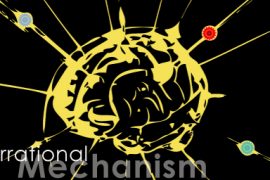What does the term “Emotional Intelligence” mean? Why do we hear about it frequently? And do we really need to adapt it to our life?

It is a Friday, and the family has gathered together as part of a weekly ritual. All members of the family are anticipating the usual entertaining anecdotes. Some are sipping on their saffron tea, and others are enjoying the aromatic Arabic coffee. One of the family members, the one who fills the place with laughter, receives an unexpected message on his phone.
With every sentence he reads, his face grows pale, which makes the entire living room fall in silence. “What’s wrong?” his worried sister asks. “One of my friends passed away,” he breaks the news with a heavy heart. “I am sorry to hear that, was he ill?” she asks. “He was a healthy man but never at ease,” he pauses, and then continues, ”He was emotionally unstable and stressed because of his bank loans. I have always wondered how he reached such an unstable financial and emotional state. He was my classmate at school and he excelled in all subjects”.
What was the reason behind his sudden death? What causes a happily married couple to suddenly crash and part ways? What is the reason behind the depression of successful employees? Why do we hear about many violence incidents, drug abuse, and eating disorders? All of these events may seem distinct from each other. However, the common factor between them, are the emotions that were felt at first but were not handled well. (Goleman, 2010)
As human beings, we all go through inevitable life events and with each event we feel different emotions such as sorrow, shame, loneliness, and anger. But we take the wrong approach to dealing with these emotions. The main reason behind this is because we were not taught how to handle them. Numerous times we have concealed our sadness with that extra full-fat meal or with a mouthful spray of whipped cream. At other times, we tried to silence our anger with the unusual three-hour long nap. Because of our weak judgment of others’ emotions, we have misinterpreted that someone hates us, and we allowed that dark shadow of loneliness to eat us up. Therefore, the concept of emotional intelligence is a great guide that we can use to handle our emotions in a smarter way.
So what is emotional intelligence? According to psychologist Daniel Goleman, emotional intelligence is the ability to recognize, understand, and manage one’s emotions, in addition to the ability to understand other’s emotions. To achieve emotional intelligence, we need to fulfill the four basic domains. The first domain is self-awareness, which means being clear and able to determine the emotions that we are feeling at the moment. After defining and acknowledging our emotions, the second step is self-management. This refers to the ability to control our emotions so they do not evolve and disturb our life patterns. Being empathetic towards others and looking at the story from their point of view is the third domain of emotional intelligence. The final domain is social skills, which simply means integrating all of the other three mentioned domains when dealing with others. (Goleman, 2012)
To understand the concept of emotional intelligence further, let us examine a real life scenario of Prince Henry of Wales, the younger son of Charles, Prince of Wales, and Diana, Princess of Wales. Prince Henry lost his mother unexpectedly at the age of twelve. He was very shocked by this loss, so he decided to shut down all his emotions. He didn’t acknowledge his feelings of sadness for two decades and was traumatized. As stated by Prince Henry, his decision had contributed to a “total chaos” in his life. Failing to resolve his emotions, which he carried for many years, disturbed his personal and professional life. In his late twenties, and only after several attempts of persuasion by his brother, Prince William, he agreed to seek counseling. After attending his sessions, Prince Henry finally opened up to his emotions and was able to grieve over the loss of his mother. Only after Prince Henry became aware of his emotions, he was able to manage them, and live a normal life again. (Olivennes, 2017)
Emotional intelligence is a concept that should be taught to all individuals and especially introduced at a young age. Therefore, this concept should be taught at classes in schools. According to Psychologist Daniel Goleman, if emotional intelligence was taught to students then this will reduce antisocial behavior, which refers to causing distress to others, and it will reduce class disruption by 10%. Percentage of students liking school and pro-social behavior, which is the act of helping others with no expectation of a reward in return, will increase by 10%. Academic achievement scores will increase by 11%. (Goleman, 2010)
So the final question after knowing all these facts, is emotional intelligence an option?
References:
Goleman, D. (2012, April 23). Retrieved April 28, 2017, from https://www.youtube.com/watch?v=Y7m9eNoB3NU
Goleman, D. (2010). Emotional intelligence: why it can matter more than IQ. London: Bloomsbury.
Olivennes, H. (2017, April 17). Prince Harry Says He Sought Counseling Over His Mother’s Death. Retrieved April 28, 2017, from https://www.nytimes.com/2017/04/17/world/europe/uk-prince-harry-death-princess-diana.html?_r=0




All these things are attached from the emotions and it has been logical making sense thing. I am sure that it will take some time to understand these types of things for human.